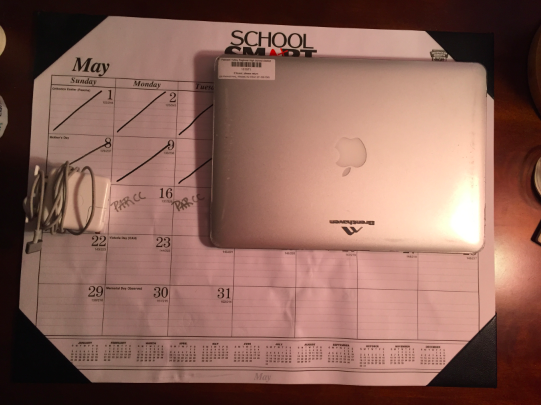
Students refusing to take the PARCC are not allowed to use any electronic devices, including laptops and cell phones.
PARCC testing day 2: students refusing to take the test not allowed to use electronics
Students who have refused the PARCC are not allowed to use electronic equipment inside the auditorium, where they are required to stay for the duration of the testing period. This involves all electronics: laptops, phones, iPods, etc.
“We were trying to minimize the bandwidth so we didn’t have as much interference running the PARCC,” PV Principal Tom DeMaio said. “We’re trying to keep as much traffic off the bandwidth as possible.”
However, although Paul Zeller, the Director of Instructional Technology in the Pascack Valley Regional High School District, said, “We have ample bandwidth,” and PV Assistant Principal John Puccio agreed, there were still problems last year when students were using electronics outside of testing.
“[Last year] those who either finished with testing or refused were streaming 5 times [the video they] normally do in a day,” Zeller said. “The bigger issue came from those playing Local Area Network Games.”
There are different types of bandwidth. Zeller specifically cited that while the school had ample “Internet bandwidth” that was not affected by students using their laptops, it did interfere with “Local Area Network“, which is relied on “heavily for testing”.
“We have a significant amount [of bandwidth]. We plan ahead,” Puccio said. “We’re testing about 700 students. We don’t want anything to affect testing. If there’s a chance that a pocket of students [in the auditorium] is going to affect anything, we’re not going to take that risk.”
“Unfortunately, last year, improper use did cause a significant number of issues,” Zeller said
After reporting the problems from last year, the district decided that students would not be allowed to use electronics for any purpose other than testing.
Zeller stated that this year, since banning electronic use outside PARCC testing, technical issues have been “near non-existent”, save for an incident where students were prompted for a password if their monitors fell asleep.
Students who refused or who finished testing would have to read silently. Students in testing areas were also provided the option of “zen coloring”.
“We want students to do something educational,” Puccio said.
“I really wanted to do work during the PARCC and since most of the work we get is online, it’s frustrating because I’m limited in what I can do,” sophomore Rima Kaddouh said.
But it is possible to disconnect laptops from the internet and wifi. By not allowing the use of laptops at all, is the school inhibiting education? Not necessarily.
“I am able to get work done,” Kaddouh said, “but it’s not the easiest environment to get work done.”
“I believe some students [last year] were trying to do work but we have a lot of students who weren’t,” Puccio said.
“[Other students] read, talk, and some do work, but I think most do nothing,” Kaddouh said.
But not all devices access the Internet. Why not allow students their phones or iPods? Phones have an airplane mode. Some iPods don’t connect to the internet at all and, even if they did, students can’t access wifi.
“We didn’t want to get into monitoring all [the electronics],” DeMaio said. “It’s too many kids. It was just simpler that way.“
“It’s not a consequence,” Puccio said. “We have to focus on this test. We have all hands on deck in this building to test over 700 kids. To have to monitor that is another daunting task that we’re asking teacher try to control and which kids are going to try to undermine.”